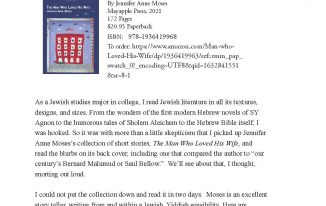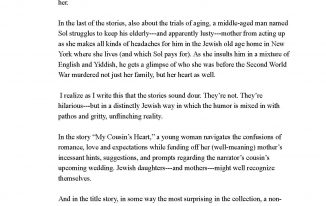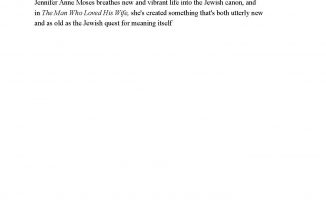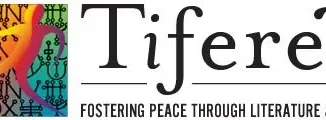Jennifer Anne Moses breathes new and vibrant life into the Jewish canon, and in “The Man Who Loved His Wife”, she’s created something that’s both utterly new and as old as the Jewish quest for meaning itself.
“The Man Who Loved His Wife” by Jennifer Anne Moses was reviewed by Jennifer Levine in the Autumn/Winter 2021 edition of Tiferet. Below, we present the review as text, .pdf and images.
A Review of The Man Who Loved His Wife by Jennifer Levine
As a Jewish studies major in college, I read Jewish literature in all its textures, designs, and sizes. From the wonders of the first modern Hebrew novels of SY Agnon to the humorous tales of Sholem Aleichem to the Hebrew Bible itself, I was hooked. So it was with more than a little skepticism that I picked up Jennifer Anne Moses’s collection of short stories, The Man Who Loved His Wife, and read the blurbs on its back cover, including one that compared the author to “our century’s Bernard Malumud or Saul Bellow.” We’ll see about that, I thought, snorting out loud.
I could not put the collection down and read it in two days. Moses is an excellent story teller, writing from and within a Jewish, Yiddish sensibility. Here are putzes, schlemiels, luftmenschens and all the rest (as well as the bewildered, the lost, the heartbroken and the deracinated) but most of all, the characters who populate the thirteen stories in the collection are so human you feel like you’re sitting in the room with them, having a schmooze. You can hear them, see them, feel their insides at work, and practically hear their footsteps as they move through the pages. Men, women, children, even dogs. Like real people (and dogs,) Moses’s characters are beautifully flawed, eccentric and compassionate.
Interestingly, both the opening and the closing stories in the collection feature characters grappling with the challenges of being very old. In the first story, “The Uncircumcised,” an elderly refugee named Felder struggles to maintain his independence in the face of his grown daughter’s insistence that he move to an assisted living facility, but not before she gives him a rescue dog as a companion. The dog, though, is not just any dog, but in Felder’s mind, the reincarnation of his long dead sister, Esther, who disappeared into the maw of the Nazi death machine. Trust me, you’ve never met a dog like Esther the dog, and you will love her.
In the last of the stories, also about the trials of aging, a middle-aged man named Sol struggles to keep his elderly—and apparently lusty—mother from acting up as she makes all kinds of headaches for him in the Jewish old age home in New York where she lives (and which Sol pays for). As she insults him in a mixture of English and Yiddish, he gets a glimpse of who she was before the Second World War murdered not just her family, but her heart as well.
I realize as I write this that the stories sound dour. They’re not. They’re hilarious—but in a distinctly Jewish way in which the humor is mixed in with pathos and gritty, unflinching reality.
In the story “My Cousin’s Heart,” a young woman navigates the confusions of romance, love and expectations while fending off her (well-meaning) mother’s incessant hints, suggestions, and prompts regarding the narrator’s cousin’s
upcoming wedding. Jewish daughters—and mothers—might well recognize themselves.
And in the title story, in some way the most surprising in the collection, a non-Jewish man loses his Jewish wife to cancer, but not before his heart breaks so far open that he knows, in some intuitive and mysterious way, that he himself has always, somehow, been a Jew.
The stories that make up the collection are varied—in tone, point of view, theme, subject, and setting (Tel Aviv, Baton Rouge, New York, and L.A., to name a few). What they have in common is that they are all Jewish, not only about Jewish characters, but about the unique ways that Jews, heirs to a long and sometimes tragic history, live in the world. It’s not that non-Jews don’t also (naturally) grapple with questions of meaning, family, God, and faith. But they don’t do it—or talk about it—the way Jews do.
I love reading Jewish authors, and also love short stories, a form that in recent decades has lost favor. For me, this is no less than a tragedy—without the short story we wouldn’t have Tevye the Dairyman, Yentl the Yeshiva Boy, or Mendele Mocher Sforim. Nor would we have this astonishing collection.
Jennifer Anne Moses breathes new and vibrant life into the Jewish canon, and in The Man Who Loved His Wife, she’s created something that’s both utterly new and as old as the Jewish quest for meaning itself.
Click below for the PDF
Moses-Review Tiferet Autumn Winter 2021 PDF
Here is the review as a series of images:




